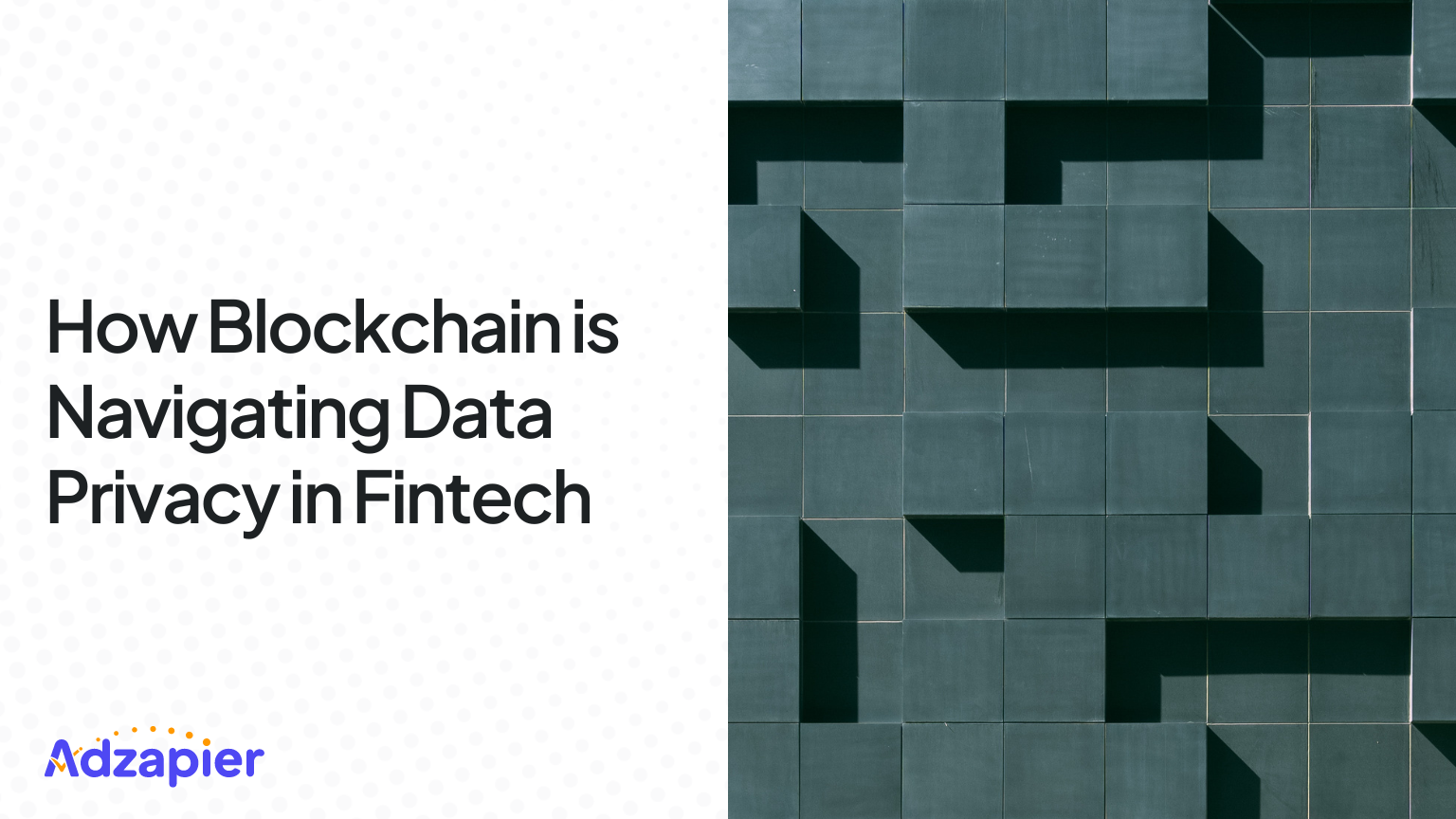How Blockchain is Navigating Data Privacy in Fin-tech
 Promotion Adzapier
Promotion Adzapier
Fin-tech is aggressively adopting Blockchain to create a data privacy infrastructure from the ground up. But what makes Blockchain a secure-technologies that the government is adopting not only most new-age fin-tech startups but even the future of the internet, Web 3.0, is based on Blockchain?
Asymmetric cryptography is a technique used by blockchain-based systems to secure user-to-user transactions. Each user in the system has a unique private or public key, a series of unrelated numbers. And this makes it possible to securely store data, making it nearly difficult to hack or alter the system.
Is your Data Secure with the Fin-techs?
Fin-tech has revolutionized financial transactions, providing customers with convenient, secure, and cost-effective solutions. However, the increasing use of digital payments, mobile banking, and online lending has also raised concerns about data privacy and security.
One of the biggest challenges facing fin-tech companies is ensuring the security and privacy of customer data. As fin-tech companies process large amounts of sensitive data, including personal and financial information, they must protect this data from unauthorized access, theft, or misuse.
This problem can be addressed by integrating a consent management platform and a cookie consent tool that effectively records user consent using tracking technologies for data collection and its process through a website or in-app support.
Data privacy is paramount in the financial services industry, where personal and financial data security is critical. Failure to ensure the confidentiality and security of customer data can lead to reputational damage, financial losses, and legal liability.
Fin-tech and its Growing obsession with Blockchain
The financial technology (fin-tech) industry has significantly transformed by introducing digital payments, online banking, peer-to-peer lending, and other innovative solutions.
However, the increasing use of digital transactions has also led to concerns among consumers at large about data privacy and security. Blockchain technology has emerged as a potential solution to address these challenges.
Blockchain is a decentralized digital ledger technology that enables secure and transparent transactions without intermediaries. Each transaction is recorded in a block linked to the previous block, creating a chain of blocks or a blockchain.
The blocks are distributed across a network of computers, known as nodes, which collectively maintain a copy of the ledger. This ensures that the ledger is secure, transparent, and tamper-proof, just like a cookie consent tool ensures that consent is taken from the user transparently and legally.
One of the key features of blockchain technology is its ability to provide anonymity and privacy to its users. This is achieved through the use of public and private keys.
Public keys are used to identify the sender and recipient of a transaction, while private keys are used to authenticate the sender's identity and to encrypt the transaction. Only the sender and recipient can access the transaction data, ensuring it remains private and secure.
The Role of Blockchain in Ensuring Data Privacy
Blockchain technology can be crucial in ensuring data privacy in the fin-tech industry. By providing a secure and decentralized system for conducting transactions, blockchain technology can help fin-tech companies address the challenges of data privacy and security.
Authentication of Users and Transactions
Blockchain technology can authenticate users and transactions, reducing the risk of fraud and ensuring that only authorized users have access to sensitive data. This is achieved through public and private keys, which identify and authenticate users.
When a user initiates a transaction, they use their private key to sign the transaction, which is then validated by the network. This ensures that only authorized users can create transactions, reducing the risk of fraud and unauthorized access to sensitive data.
Secure and Decentralized Data Storage
Blockchain technology can also be used to store and share data in a secure and decentralized manner. This means that sensitive data can be stored on multiple networks of nodes rather than on a single centralized server. This reduces the risk of data breaches and hacking, as the data is distributed across multiple nodes and cannot be tampered with or altered.
The decentralized nature of blockchain technology ensures that the data is secure and tamper-proof, as each node maintains a copy of the same data. This means that even if one node is compromised, the data on the other nodes will remain secure.
Transparency and Accountability
Another critical advantage of blockchain technology is its transparency and accountability in transactions. As all transactions are recorded on a public ledger, they can be easily traced and audited. This provides greater transparency and accountability, as all parties involved in the transaction can verify the authenticity of the data and ensure that it has not been tampered with.
Conclusion:
Consumers are looking forward to personalized financial products and services that Fin-tech companies excel in compared to other industries, and Blockchain is only accelerating its growth. With technologies like Blockchain, customers have a hopeful future as businesses will likely adopt privacy as their core branding strategy.
Visit Adzapier to learn more about Data, Privacy, and Compliance.
Subscribe to my newsletter
Read articles from Promotion Adzapier directly inside your inbox. Subscribe to the newsletter, and don't miss out.
Written by

Promotion Adzapier
Promotion Adzapier
We started Adzapier because we wanted to make the Internet a better place with more transparency and control for consumers over their own data. We are a team of tech wizards and marketing experts using data & privacy compliance to increase your consumer engagement, brand trust, and customer acquisition.